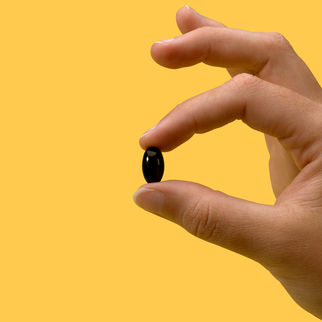Life moves at a fast pace, and with it, our bodies bear the brunt of physical exertions, whether it's a heart-pounding workout session or the simple act of chasing after a bus.
The physical activities necessary to navigate lives put our muscles to the test, leading to wear and tear — but don’t fret. It’s in these micro-moments of strain that the magic of muscle development happens. After all, how can you ever expect to grow without challenge?
As we continue to push our muscles to improve, the recovery phase is a key part of the journey, as this is when our muscles are restored and strengthened.
Enter the world of vitamins. These incredible micronutrients, often overlooked in the grand scheme of nutrition, just might hold the key to effective muscle recovery.
Here at iwi life, we celebrate the synergy of health and nutrition, crafting products that stand at this intersection, ensuring your muscles and overall well-being are cared for. Join us as we dive deeper into the role that vitamins play in muscle recovery.
Why Is Proper Muscle Recovery Essential?
Every movement we make, from everyday activities to more intense workouts, has an impact on our muscles. These activities lead to tiny shifts in our muscle fibers. It's nature's way of letting us evolve, grow robust, and be more adaptable.
Nurturing muscle recovery ensures these fibers have the right environment and nourishment to rejuvenate and rebuild. By focusing on recovery, we make sure muscles are at their peak performance, minimize potential injuries, and elevate our overall physical abilities.
So, whether you're dancing to your favorite tune, lifting a new piece of furniture, or diving into a high-energy sport, it's vital to give your muscles the plant-based nutrients they need to thrive and stay strong.
How Does Nutrition Impact Muscle Recovery?
What we eat is linked to how our muscles perform and recover. Macronutrients, like proteins and carbs, serve as the main fuel and the essential repair tools for our muscles. Meanwhile, micronutrients, particularly vitamins, are the unsung heroes that supercharge muscle recovery, ease tension, and restore our energy reserves.
Here at iwi life, we're passionate about nutrition, and the promise of algae when it comes to nutrition. We craft supplements that not only promote muscle recovery but also resonate with our values of sustainability and purity. Dive into the world of algae with us and uncover its myriad benefits for a vibrant, healthier you.
Which Vitamins Are Crucial for Muscle Recovery?
Vitamins are crucial in facilitating countless cellular reactions in the body. When it comes to muscle recovery, here are the key players:
1. Vitamin A
Vitamin A is more than just an eye-friendly nutrient. Essential for protein synthesis, it plays a crucial role in muscle development and regeneration.
Think of vitamin A as the fertilizer for muscle cells, ensuring that they grow properly. Especially after intense workouts, when muscle fibers go through micro-tears, vitamin A steps in to help guide efficient protein synthesis, leading to muscle repair and growth.
2. Vitamin B1 (Thiamin)
Every move we make, every step we take, our muscles are hard at work. What powers these actions? The energy released by muscle cells, thanks to vitamin B1.
As a crucial part of our muscles' energy production, vitamin B1 helps convert the food we consume into fuel, ensuring that our muscles are always ready to perform. Without adequate Thiamin, our muscles might feel fatigued and weak, emphasizing its importance in muscle recovery.
3. Vitamin B2 (Riboflavin)
If muscles were structures, amino acids would be their bricks. Vitamin B2, in this analogy, ensures that we have the right quality and quantity of bricks.
By aiding in both energy and maintaining normal levels of homocysteine (a crucial amino acid), riboflavin stands as a pillar in muscle health. It ensures that the energy levels in muscle cells are optimal while also promoting the production of amino acids, the very building blocks of muscles.
4. Vitamin B3 (Niacin)
Our DNA, though microscopic, plays a massive role in determining how our body functions — and, like all things, it can suffer damage, especially in muscle cells that undergo stress from physical activities.
Vitamin B3 dives deep into these cells, helping to support the proper repair DNA strands.This restoration process is fundamental, as it makes sure that muscle cells function and recover appropriately.
5. Vitamin B6 (Pyridoxine)
By assisting in the release of glycogen, an energy form stored in our muscles and liver, vitamin B6 ensures that our muscles have access to the energy they require, especially during short, intense bursts of activity.
6. Vitamin B7 (Biotin)
Our body's metabolism is a complex web of reactions that produce energy, build proteins, and more. Vitamin B7 is right at the heart of these processes.
By supporting energy production and the metabolism of amino acids, biotin plays an instrumental role in ensuring that our muscles recover and function effectively.
7. Vitamin B9 (Folic Acid)
Cell growth is the essence of muscle recovery. As our body mends the micro-tears in muscle fibers post-exercise, it requires a rapid production of cells — and vitamin B9 supports this process.
By aiding in cell growth and amino acid metabolism, Folic Acid ensures that recovering muscles have all they need to rebuild stronger.
8. Vitamin B12 (Cobalamin)
Oxygen is the lifeline of our cells, especially during physical exertion. Vitamin B12 plays a critical role in forming red blood cells, which carry oxygen to our muscle tissues.
Without Cobalamin's contribution, our muscles might be gasping for oxygen, leading to quicker fatigue and slower recovery.
9. Vitamin C
Exercise, while beneficial, also induces oxidative stress in our muscles. Vitamin C, a potent antioxidant, supports cell health during this stress, ensuring muscle cells stay healthy and strong.
By working to support your cell health during exposure to free radicals, vitamin C ensures that our muscles remain in good shape, ready to tackle another day of challenges.
10. Vitamin D
Sunlight does more than brighten our day. It helps our skin produce vitamin D, a nutrient vital for muscle function.
By optimizing calcium levels in our bloodstream, vitamin D ensures that our muscles contract and relax appropriately, aiding in both performance and recovery.
11. Vitamin E
If vitamin C is the first line of defense against oxidative stress, vitamin E is the underdog.
Especially important for endurance athletes, this antioxidant ensures that long bouts of exercise don't result in extensive muscle cell damage.
12. Vitamin K
Often overlooked, vitamin K plays a silent (but important) role in our muscular health. While it’s primarily known for its role in blood clotting, it’s also crucial for bone health.
Strong bones support strong muscles, so vitamin K has an indirect yet significant contribution to muscle function and recovery.
What Are Some Tips for Including These Vitamins in Your Diet?
In the daily hustle and bustle of work schedules, social lives, family obligations, and more, it can feel tricky to make sure your plate has everything you need. Here are some of our top tips for diversifying your diet and making sure you’re getting the right nutrients:
- Diverse food choices: Aim for a colorful plate by incorporating a rainbow of fruits and vegetables, robust lean proteins, and hearty whole grains. This doesn’t just satiate your taste buds but ensures a spectrum of nutrients that support recovery.
- Vitamin D: Vitamin D, often dubbed the “sunshine vitamin,” can be produced in the body via the sun’s interactions with our skin. Embrace the morning sun with short, sweet sunbathes. Just 10-15 minutes can do wonders. Don't forget your sunscreen for extended exposures!
- Bridging the gap: Even with the best intentions, our diets might sometimes fall short. This is where supplements come into play. But remember, not all supplements are created equal. Opt for those that prioritize sustainable production and high-quality ingredients. Your body deserves the best, after all.
The Takeaway
Every stretch, every sprint, every stair climbed—our muscles are silent warriors, supporting us through life's adventures. They deserve the finest nutrients.
And while we nourish ourselves, why not choose options that nourish our planet too? Algae stands tall, promising a future of holistic health intertwined with sustainability.
Here at iwi life, each of our supplements takes you one step further on your wellness journey — and one step closer to a more sustainable routine, too.
Sources:
Thiamin | Health Professional Fact Sheet | NIH
Role of Nicotinamide in DNA Damage, Mutagenesis, and DNA Repair | PMC
Riboflavin | Health Professional Fact Sheet | NIH
Vitamin B6 | Linus Pauling Institute | Oregon State University
Biotin – Vitamin B7 | The Nutrition Source | Harvard T.H. Chan School of Public Health
Folate (Folic Acid) | Mayo Clinic
Vitamin B12–Deficiency Anemia | NHLBI



















